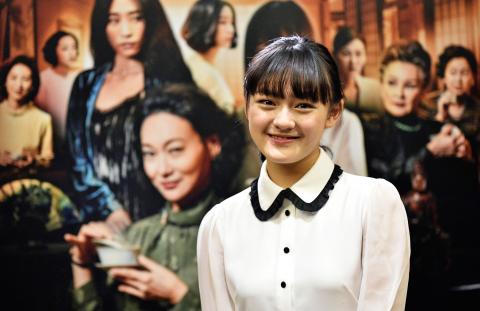Vicky Chen (陳文淇) is a laid-back 14-year-old with an easy smile, but the Taiwanese actress is already a force to be reckoned with, nominated for two major awards at the Chinese-language equivalent of the Oscars. Chen could make history tonight as the youngest ever contender to be crowned best actress at the Taipei Golden Horse Film Festival (台北金馬影展) awards.
Local media have dubbed her a “prodigy” able to play complex characters in movies that tackle a range of difficult subjects.
Chen is nominated for the best actress award for her role in Angels Wear White (嘉年華) directed by China’s Vivian Qu (文晏), in which she plays a runaway who witnesses a sexual assault and struggles between her conscience and saving her job by staying quiet.

Photo: AFP
DOUBLE NOMINATION
She is also up for best supporting actress in Taiwanese director Yang Ya-che’s (楊雅?) thriller The Bold, the Corrupt and the Beautiful, where she takes the role of an upper-class heiress in a family gripped by dark political and business intrigues. The film includes a scene in which her character is raped. Chen describes the roles as “very challenging.”
“I wanted to try them out, even though I felt nervous,” Chen said.
“I am very young so there are some things I don’t understand. I rely on communicating with my seniors, other actors and the director about any questions I have over the script.”
Chen’s acting career started four years ago when she was cast in a film in China, where her family is based. She went on to appear in a number of movies and TV dramas before landing a lead role in Angels Wear White, which competed at this year’s Venice Film Festival.
“I like acting because I feel very happy and accomplished after finishing a scene,” she said.
ORDINARY CLASSMATE
Giving back-to-back interviews ahead of tonight’s ceremony, Chen appeared poised, but said days can be long as she balances her acting commitments, school work and private tutoring. Teachers and fellow students are not treating her any differently after the nominations, she said.
“My classmates see me as their classmate and my teachers see me as their student. I don’t put too much pressure on myself,” she said. “Perhaps the most difficult part for me is to get up early and go to sleep late.”
In the wake of more than 100 women coming forward to accuse Hollywood movie mogul Harvey Weinstein of sexual misconduct — ranging from harassment to rape — there is a spotlight on the global film industry and its treatment of young actresses.
Chen said she was aware of the issues but felt she was in safe hands, with her family and management constantly by her side.
“I am very well protected and I am also careful,” she said.
Her ambition is to continue with her studies alongside her movie career — she counts Oscar-winning actress Natalie Portman and Australian singer-actor and YouTube sensation Troye Sivan among her role models. While she has made her name by taking on heavy-duty parts, Chen says she would next like to play a “sunny girl,” which is closer to how she sees herself. Director Yang said he has no doubts about her potential.
“She has talent of course,” he said.
“But most importantly, she has a lot of passion.”

Following the shock complete failure of all the recall votes against Chinese Nationalist Party (KMT) lawmakers on July 26, pan-blue supporters and the Chinese Communist Party (CCP) were giddy with victory. A notable exception was KMT Chairman Eric Chu (朱立倫), who knew better. At a press conference on July 29, he bowed deeply in gratitude to the voters and said the recalls were “not about which party won or lost, but were a great victory for the Taiwanese voters.” The entire recall process was a disaster for both the KMT and the Democratic Progressive Party (DPP). The only bright spot for

As last month dawned, the Democratic Progressive Party (DPP) was in a good position. The recall campaigns had strong momentum, polling showed many Chinese Nationalist Party (KMT) lawmakers at risk of recall and even the KMT was bracing for losing seats while facing a tsunami of voter fraud investigations. Polling pointed to some of the recalls being a lock for victory. Though in most districts the majority was against recalling their lawmaker, among voters “definitely” planning to vote, there were double-digit margins in favor of recall in at least five districts, with three districts near or above 20 percent in

From Godzilla’s fiery atomic breath to post-apocalyptic anime and harrowing depictions of radiation sickness, the influence of the nuclear bombings of Hiroshima and Nagasaki runs deep in Japanese popular culture. In the 80 years since the World War II attacks, stories of destruction and mutation have been fused with fears around natural disasters and, more recently, the Fukushima crisis. Classic manga and anime series Astro Boy is called “Mighty Atom” in Japanese, while city-leveling explosions loom large in other titles such as Akira, Neon Genesis Evangelion and Attack on Titan. “Living through tremendous pain” and overcoming trauma is a recurrent theme in Japan’s

The great number of islands that make up the Penghu archipelago make it a fascinating place to come back and explore again and again. On your next trip to Penghu, why not get off the beaten path and explore a lesser-traveled outlying island? Jibei Island (吉貝嶼) in Baisha Township (白沙鄉) is a popular destination for its long white sand beach and water activities. However, three other permanently inhabited islands in the township put a unique spin on the traditional Penghu charm, making them great destinations for the curious tourist: Yuanbeiyu (員貝嶼), Niaoyu (鳥嶼) and Dacangyu (大倉嶼). YUANBEIYU Citou Wharf (岐頭碼頭) connects the mainland